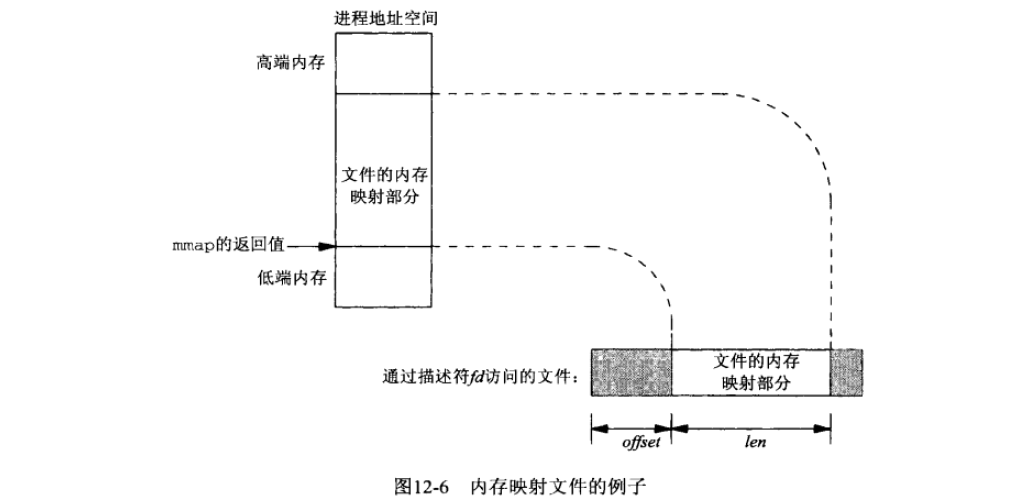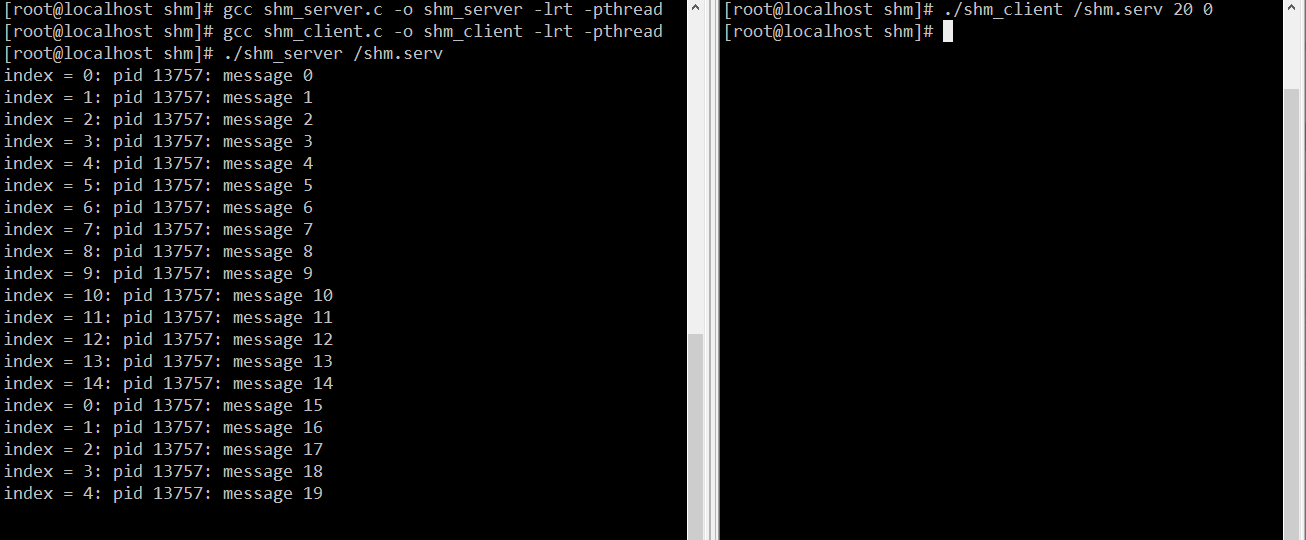一、共享内存区
所谓共享内存区,即程序通过固定大小的物理存储链接到本地内存中,这种IPC形式是最快的。管道、FIFO和消息队列的问题在于,两个进程要交换信息时,这些信息必须由内核传递。
共享内存区示意图:

共享内存区的限制:

二、Posix 共享内存区
基于Posix 共享内存区的生产者--消费者实现。
案例示意图:

? 注意:shm_open()输入的文件名以/开头,后面紧接文件名,不能再出现/。
创建共享内存区后,可以通过命令:ll /dev/shm 查看有哪些,其中 shm.serv 就是用户创建的。

服务器
shm_server.c
#include <stdio.h>
#include <stdlib.h>
#include <string.h>
#include <signal.h>
#include <getopt.h>
#include <unistd.h>
#include <sys/types.h>
#include <semaphore.h>
#include <fcntl.h>
#include <sys/stat.h>
#include <sys/mman.h>
#define MESG_SIZE 256 /* max #bytes per message, incl. null at end */
#define N_MESG 15 /* max #messages */
struct shmstruct
{
sem_t mutex; /* the Posix memory-based semaphores */
sem_t n_empty;
sem_t n_stored;
int n_put; /* index into msg_off[] for next put */
long n_overflow; /* #overflows by senders */
sem_t n_overflow_mutex; /* mutex for n_overflow counter */
long msg_off[N_MESG]; /* offset in shared memory of each message */
char msg_data[N_MESG * MESG_SIZE]; /* the actual messages */
};
const char *SHM_SERV = NULL;
/* signal handler for catching ctrl+c */
void sigint(int signum)
{
printf("\nserver terminated by user.\n");
/* 删除一个名字不会影响对于底层支撑对象的现有调用,直到对于该对象的引用全部关闭为止 */
shm_unlink(SHM_SERV);
exit(EXIT_SUCCESS);
}
int main(int argc, char **argv)
{
int fd, index, last_n_overflow, temp;
long offset;
struct shmstruct *ptr;
if (argc != 2)
{
printf("usage: %s <name>\n", argv[0]);
exit(EXIT_FAILURE);
}
/* create shm, set its size, map it, close descriptor */
SHM_SERV = argv[1];
if ((fd = shm_open(argv[1], O_RDWR | O_CREAT | O_EXCL, 0666)) < 0)
{
perror("shm_open()");
exit(EXIT_FAILURE);
}
ptr = mmap(NULL, sizeof(struct shmstruct), PROT_READ | PROT_WRITE, MAP_SHARED, fd, 0);
ftruncate(fd, sizeof(struct shmstruct));
close(fd);
/* initialize the array of offsets */
for (index = 0; index < N_MESG; index++)
{
ptr->msg_off[index] = index * MESG_SIZE;
}
/* initialize the semaphores int shared memory */
sem_init(&ptr->mutex, 1, 1);
sem_init(&ptr->n_empty, 1, N_MESG);
sem_init(&ptr->n_stored, 1, 0);
sem_init(&ptr->n_overflow_mutex, 1, 1);
/* consumer */
index = 0;
last_n_overflow = 0;
signal(SIGINT, sigint); // catch ctrl+c
while (1)
{
sem_wait(&ptr->n_stored);
sem_wait(&ptr->mutex);
offset = ptr->msg_off[index];
printf("index = %d: %s\n", index, &ptr->msg_data[offset]);
if (++index >= N_MESG)
{
index = 0; /* circular buffer */
}
sem_post(&ptr->mutex);
sem_post(&ptr->n_empty);
sem_wait(&ptr->n_overflow_mutex);
temp = ptr->n_overflow;
sem_post(&ptr->n_overflow_mutex);
if (temp != last_n_overflow)
{
printf("n_overflow = %d\n", temp);
last_n_overflow = temp;
}
}
exit(0);
}
客户端
shm_client.c
#include <stdio.h>
#include <stdlib.h>
#include <string.h>
#include <errno.h>
#include <getopt.h>
#include <unistd.h>
#include <sys/types.h>
#include <semaphore.h>
#include <fcntl.h>
#include <sys/stat.h>
#include <sys/mman.h>
#define MESG_SIZE 256 /* max #bytes per message, incl. null at end */
#define N_MESG 15 /* max #messages */
struct shmstruct
{
sem_t mutex; /* the Posix memory-based semaphores */
sem_t n_empty;
sem_t n_stored;
int n_put; /* index into msg_off[] for next put */
long n_overflow; /* #overflows by senders */
sem_t n_overflow_mutex; /* mutex for n_overflow counter */
long msg_off[N_MESG]; /* offset in shared memory of each message */
char msg_data[N_MESG * MESG_SIZE]; /* the actual messages */
};
int main(int argc, char **argv)
{
int fd, i, nloop, nusec;
pid_t pid;
char mesg[MESG_SIZE];
long offset;
struct shmstruct *ptr;
if (argc != 4)
{
printf("usage: %s <name> <#loops> <#usec>\n", argv[0]);
exit(EXIT_FAILURE);
}
nloop = atoi(argv[2]);
nusec = atoi(argv[3]);
/* open and map shared memory that server must create */
if ((fd = shm_open(argv[1], O_RDWR, 0666)) < 0)
{
perror("shm_open()");
exit(EXIT_FAILURE);
}
ptr = mmap(NULL, sizeof(struct shmstruct), PROT_READ | PROT_WRITE, MAP_SHARED, fd, 0);
close(fd);
/* producer */
pid = getpid();
for (i = 0; i < nloop; i++)
{
usleep(nusec);
snprintf(mesg, MESG_SIZE, "pid %ld: message %d", (long)pid, i);
if (sem_trywait(&ptr->n_empty) == -1)
{
if (errno == EAGAIN)
{
sem_wait(&ptr->n_overflow_mutex);
ptr->n_overflow++;
sem_post(&ptr->n_overflow_mutex);
continue;;
}
else
{
printf("err_trywait error\n");
exit(EXIT_FAILURE);
}
}
sem_wait(&ptr->mutex);
offset = ptr->msg_off[ptr->n_put];
if (++(ptr->n_put) >= N_MESG)
{
ptr->n_put = 0; /* circular buffer */
}
sem_post(&ptr->mutex);
strcpy(&ptr->msg_data[offset], mesg);
sem_post(&ptr->n_stored);
}
exit(0);
}
运行测试:

三、System V 共享内存区
System V共享内存区和Posix 共享内存区的使用区别不大。
基于System V 共享内存区的生产者--消费者实现。
服务器
shm_server.c
#include <stdio.h>
#include <stdlib.h>
#include <string.h>
#include <error.h>
#include <signal.h>
#include <unistd.h>
#include <sys/types.h>
#include <sys/stat.h>
#include <sys/wait.h>
#include <fcntl.h>
#include <getopt.h>
#include <limits.h>
#include <errno.h>
#include <semaphore.h>
#include <sys/ipc.h>
#include <sys/shm.h> // system v共享内存区头文件
#define SHM_SERV_KET 1214L
#define MESG_SIZE 256 /* max #bytes per message, incl. null at end */
#define N_MESG 10 /* max #messages */
struct shmstruct
{
sem_t mutex; /* the Posix memory-based semaphores */
sem_t n_empty;
sem_t n_stored;
int n_put; /* index into msg_off[] for next put */
long n_overflow; /* #overflows by senders */
sem_t n_overflow_mutex; /* mutex for n_overflow counter */
long msg_off[N_MESG]; /* offset in shared memory of each message */
char msg_data[N_MESG * MESG_SIZE]; /* the actual messages */
};
static int shm_id;
/* signal handler for catching ctrl+c */
void sigint(int signum)
{
printf("\nserver terminated by user.\n");
if (shm_id >= 0)
{
shmctl(shm_id, IPC_RMID, NULL);
}
exit(EXIT_SUCCESS);
}
int main(int argc, char **argv)
{
int index, last_n_overflow, temp;
long offset;
struct shmstruct *ptr = NULL;
struct shmid_ds attr;
/* create shm */
if ((shm_id = shmget(SHM_SERV_KET, sizeof(struct shmstruct), 0666 | IPC_CREAT)) < 0)
{
perror("shmget()");
exit(EXIT_FAILURE);
}
if((ptr = shmat(shm_id, NULL, 0)) == NULL)
{
printf("shmat(): error\n");
exit(EXIT_FAILURE);
}
/* initialize the array of offsets */
for (index = 0; index < N_MESG; index++)
{
ptr->msg_off[index] = index * MESG_SIZE;
}
/* initialize the semaphores int shared memory */
sem_init(&ptr->mutex, 1, 1);
sem_init(&ptr->n_empty, 1, N_MESG);
sem_init(&ptr->n_stored, 1, 0);
sem_init(&ptr->n_overflow_mutex, 1, 1);
/* consumer */
index = 0;
last_n_overflow = 0;
signal(SIGINT, sigint); // catch ctrl+c
while (1)
{
sem_wait(&ptr->n_stored);
sem_wait(&ptr->mutex);
offset = ptr->msg_off[index];
printf("index = %d: %s\n", index, &ptr->msg_data[offset]);
if (++index >= N_MESG)
{
index = 0; /* circular buffer */
}
sem_post(&ptr->mutex);
sem_post(&ptr->n_empty);
sem_wait(&ptr->n_overflow_mutex);
temp = ptr->n_overflow;
sem_post(&ptr->n_overflow_mutex);
if (temp != last_n_overflow)
{
printf("n_overflow = %d\n", temp);
last_n_overflow = temp;
}
}
exit(EXIT_FAILURE);
}
客户端
shm_client.c
#include <stdio.h>
#include <stdlib.h>
#include <string.h>
#include <error.h>
#include <signal.h>
#include <unistd.h>
#include <sys/types.h>
#include <sys/stat.h>
#include <sys/wait.h>
#include <fcntl.h>
#include <getopt.h>
#include <limits.h>
#include <errno.h>
#include <semaphore.h>
#include <sys/ipc.h>
#include <sys/shm.h> // system v共享内存区头文件
#define SHM_SERV_KET 1214L
#define MESG_SIZE 256 /* max #bytes per message, incl. null at end */
#define N_MESG 10 /* max #messages */
struct shmstruct
{
sem_t mutex; /* the Posix memory-based semaphores */
sem_t n_empty;
sem_t n_stored;
int n_put; /* index into msg_off[] for next put */
long n_overflow; /* #overflows by senders */
sem_t n_overflow_mutex; /* mutex for n_overflow counter */
long msg_off[N_MESG]; /* offset in shared memory of each message */
char msg_data[N_MESG * MESG_SIZE]; /* the actual messages */
};
int main(int argc, char **argv)
{
static int shm_id;
int fd, i, nloop, nusec;
pid_t pid;
char mesg[MESG_SIZE];
long offset;
struct shmstruct *ptr = NULL;
if (argc != 3)
{
printf("usage: %s <#loops> <#usec>\n", argv[0]);
exit(EXIT_FAILURE);
}
nloop = atoi(argv[1]);
nusec = atoi(argv[2]);
if ((shm_id = shmget(SHM_SERV_KET, 0, 0666)) < 0)
{
perror("shmget()");
exit(EXIT_FAILURE);
}
if ((ptr = shmat(shm_id, NULL, 0)) == NULL)
{
printf("shmat(): error\n");
exit(EXIT_FAILURE);
}
/* producer */
printf("#loops = %d, #usec = %d\n", nloop, nusec);
pid = getpid();
for (i = 0; i < nloop; i++)
{
usleep(nusec);
snprintf(mesg, MESG_SIZE, "pid %ld: message %d", (long)pid, i);
if (sem_trywait(&ptr->n_empty) == -1)
{
if (errno == EAGAIN)
{
sem_wait(&ptr->n_overflow_mutex);
ptr->n_overflow++;
sem_post(&ptr->n_overflow_mutex);
continue;;
}
else
{
printf("err_trywait error\n");
exit(EXIT_FAILURE);
}
}
sem_wait(&ptr->mutex);
offset = ptr->msg_off[ptr->n_put];
if (++(ptr->n_put) >= N_MESG)
{
ptr->n_put = 0; /* circular buffer */
}
sem_post(&ptr->mutex);
strcpy(&ptr->msg_data[offset], mesg);
sem_post(&ptr->n_stored);
}
shmdt(ptr);
exit(0);
}
运行测试:

四、参考引用
IPC之八:使用 POSIX 共享内存进行进程间通信的实例
IPC之七:使用 System V 共享内存段进行进程间通信的实例